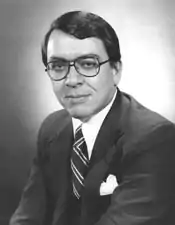Robert Bauman
Robert E. Bauman (born April 4, 1937) is an American lawyer and politician. He is a former member of the U.S. House of Representatives from Maryland's 1st congressional district (1973–1981). Bauman was a prominent conservative advocate in the House, legal counsel for The Sovereign Society, and author of financial books.
Robert Bauman | |
|---|---|
 | |
| Member of the U.S. House of Representatives from Maryland's 1st district | |
| In office August 21, 1973 – January 3, 1981 | |
| Preceded by | William Mills |
| Succeeded by | Roy Dyson |
| Member of the Maryland Senate from the 15th district | |
| In office January 13, 1971 – January 10, 1973 | |
| Personal details | |
| Born | April 4, 1937 Bryn Mawr, Pennsylvania, U.S. |
| Political party | Republican |
| Spouse(s) | Carol Dawson (Divorced) |
| Children | 4 |
| Residence | Dallas, Texas[1] |
| Education | Georgetown University (BS, JD) |
Early life and career
Robert Edmund Bauman was born in Bryn Mawr, Pennsylvania, to an unwed single mother.[2][3][4] When a teenager, Bauman moved to Easton, Maryland, where he attended Easton High School until 1953. In 1955, he graduated from the Capitol Page School at the Library of Congress in Washington, D.C.. He obtained a B.S. in international affairs from the School of Foreign Service at Georgetown University in 1959, and a J.D. degree from Georgetown University Law Center in 1964. He was admitted to the Maryland Bar in 1964, was later admitted to the District of Columbia bar, and entered into private practice as a lawyer.[5]
Representative Bauman, politically known as "Bob Bauman," served as a delegate to the Republican National Conventions of 1964, 1972, 1976 and 1980. He was also a member of the Federal Hospital Council of the United States Department of Health, Education, and Welfare from 1970 to 1973. In 1970, he was elected to the Maryland Senate, where he served as a member from 1971 to 1973.[5]
A Roman Catholic, he was married to Carol Dawson, a co-founder of Young Americans for Freedom,[2] with whom he had four children.
United States Congress
Bauman was elected to the United States House of Representatives as a Republican in an August 1973 special election. He replaced William O. Mills, who had committed suicide the previous May.[5]
Political positions
In Congress, Bauman established a reputation as a staunch conservative, often criticizing the state of morality in the United States. He was a founding member of several conservative activist groups, including the Young Americans for Freedom (YAF) and the American Conservative Union (ACU), and he served both as national chairman.[6] Bauman was also known for his exceptional knowledge of parliamentary procedure and was considered a rising star in the Republican Party in the late 1970s.[6]
Scandal
On October 3, 1980, while he was running for re-election, Bauman was charged for soliciting sex from a 16-year-old male prostitute.
After the charges were made public, Bauman said he was suffering from alcoholism and entered himself into a court-supervised rehabilitation program, which, upon successful completion, resulted in the charges being dropped. Bauman stated he would continue his re-election campaign, and apologized to voters for his indiscretions.[7]
Bauman was defeated by Democrat Roy Dyson on November 4, 1980. Dyson was not considered a serious contender for the seat before the charges were filed against Bauman.[8] In 1982, Bauman again ran for the nomination for the House seat he had lost, but withdrew from the race before primary election day.[5]
Post-congressional activities
Bauman was co-founder and legal counsel for the Sovereign Society, a group dedicated to promoting offshore banking and investment, that funneled clients to the Panamanian law firm Mossack Fonseca to help them avoid paying taxes to the United States government. "Our [the Sovereign Society] philosophy is not promoted by tax evasion but tax avoidance," Bauman said in an interview. "We serve as a conduit for people who want certain things offshore."[9]
Bauman is the author of numerous books on offshore and tax haven issues. He also wrote an autobiography, The Gentleman from Maryland: The Conscience of a Gay Conservative, which was published in 1986.[10]
See also
References
- "Robert E. Bauman Lawyer Profile". Martindale.com. Martindale-Hubbell. Retrieved December 29, 2020.
- Polman, Dick (August 14, 1986). "Out Of The Closet And Into An Abyss; Once A Darling Of The Political Right, Robert Bauman Fell Hard From Congress When It Was Revealed That He Was Gay". Philadelphia Inquirer. Archived from the original on December 11, 2014.
- Curtis, Georgina Pell; Elder, Benedict, eds. (1977). The American Catholic Who's who, Volumes 21-23. NC News Service – via Google Books.
- Kestenbaum, Lawrence. "The Political Graveyard: Young Americans for Freedom, politicians". The Political Graveyard.
- United States Congress. "Robert Bauman (id: B000244)". Biographical Directory of the United States Congress.
- Weiser, Benjamin; Diehl, Jackson (October 3, 1980). "Rep. Bauman in Court". The Washington Post. p. A1.
- Bauman, Robert E. (September 19, 1983). "A Former Congressman, Once a Staunch Foe of Gay Rights, Confronts His Own Homosexuality". People.
- Russakoff, Dale; Saperstein, Saundra (November 5, 1980). "Bauman Concedes Defeat in Maryland's First Congressional District". The Washington Post. p. A21.
- Hall, Kevin G. (June 1, 2016). "Sovereign Society fed clients to Panama Papers law firm". McClatchy. McClatchy Washington Bureau. Retrieved November 3, 2019.
- Bauman, Robert (August 1986). The Gentleman from Maryland: The Conscience of a Gay Conservative. Arbor House. ISBN 978-0877956860.
External links
| U.S. House of Representatives | ||
|---|---|---|
| Preceded by William Mills |
Member of the U.S. House of Representatives from Maryland's 1st congressional district 1973–1981 |
Succeeded by Roy Dyson |